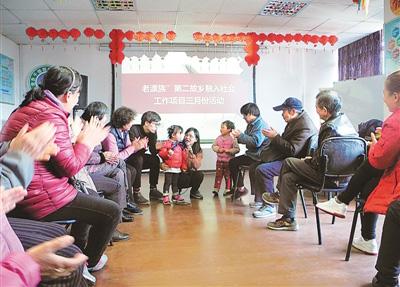


The term “elderly drifters”, or “laopiao” in Chinese, is used to refer to a large group of the aging population who migrate to cities where their children live and work.
This kind of migration has amounted to nearly 18 million people in China, according to the National Health Commission statistics, accounting for 7.2 percent of the 247-million strong migrating population. Almost half of them migrate to take care of their children and the younger generation, People’s Daily reported.
Generally, they wake up early, prepare breakfast for their working children and grandchildren, and then their daily schedule centers around preparing meals for the whole family and taking their grandchildren to school.
Although most are tired but happy, some feel they are part of an “invisible population” due to different dialects or living habits in their new city, a 2016-2017 report on Beijing social governance development disclosed.
The “laopiaos” or “elderly drifters” appear in the process of peri-urbanization, said Professor Mu Guangzong at Peking University. It’s a sign of improved urbanization in China.
The associated risks of an elderly population leaving their hometowns are mainly old-age security, health care and social communication, said Professor Mu. With a fixed mindset, lifestyle and reliance on acquaintance, they may feel isolated and misunderstood, thus affecting personal evaluation of their old-age life.
Miao Yanmei, a junior social worker and associate professor at Beijing City University, is dedicated to finding out how to make these migrating old people happy.
Miao’s surveys indicate that a half of these aged migrants come from other provinces and cities, mainly rural towns and villages. Some regarded their stay with the younger generation in a strange city as a “fixed-term imprisonment.” What’s worrying is the fact that a large number of Laopiaos may suffer from mental illness such as depression.
The Professor’s social work group in Beijing initiated a series of activities to get the aged migrants into communities, such as lectures on life and health and even singing competitions. With a strengthened sense of belonging, they will feel more secure and happy. With an added sense of happiness, they'll find a long-term stay more enjoyable.
Making elderly migrants happy requires the coordinated efforts of their children, governments and the whole society, according to Yuan Zhifa, the author of Happy Old Age. He calls for adults to treat their aging parents as they do their children, giving more time, tolerance, company and understanding.
In addition, governments should provide better social service, but also build up an old age care system for this special group.
 Fire brigade in Shanghai holds group wedding
Fire brigade in Shanghai holds group wedding Tourists enjoy ice sculptures in Datan Town, north China
Tourists enjoy ice sculptures in Datan Town, north China Sunset scenery of Dayan Pagoda in Xi'an
Sunset scenery of Dayan Pagoda in Xi'an Tourists have fun at scenic spot in Nanlong Town, NW China
Tourists have fun at scenic spot in Nanlong Town, NW China Harbin attracts tourists by making best use of ice in winter
Harbin attracts tourists by making best use of ice in winter In pics: FIS Alpine Ski Women's World Cup Slalom
In pics: FIS Alpine Ski Women's World Cup Slalom Black-necked cranes rest at reservoir in Lhunzhub County, Lhasa
Black-necked cranes rest at reservoir in Lhunzhub County, Lhasa China's FAST telescope will be available to foreign scientists in April
China's FAST telescope will be available to foreign scientists in April "She power" plays indispensable role in poverty alleviation
"She power" plays indispensable role in poverty alleviation Top 10 world news events of People's Daily in 2020
Top 10 world news events of People's Daily in 2020 Top 10 China news events of People's Daily in 2020
Top 10 China news events of People's Daily in 2020 Top 10 media buzzwords of 2020
Top 10 media buzzwords of 2020 Year-ender:10 major tourism stories of 2020
Year-ender:10 major tourism stories of 2020 No interference in Venezuelan issues
No interference in Venezuelan issues
 Biz prepares for trade spat
Biz prepares for trade spat
 Broadcasting Continent
Broadcasting Continent Australia wins Chinese CEOs as US loses
Australia wins Chinese CEOs as US loses